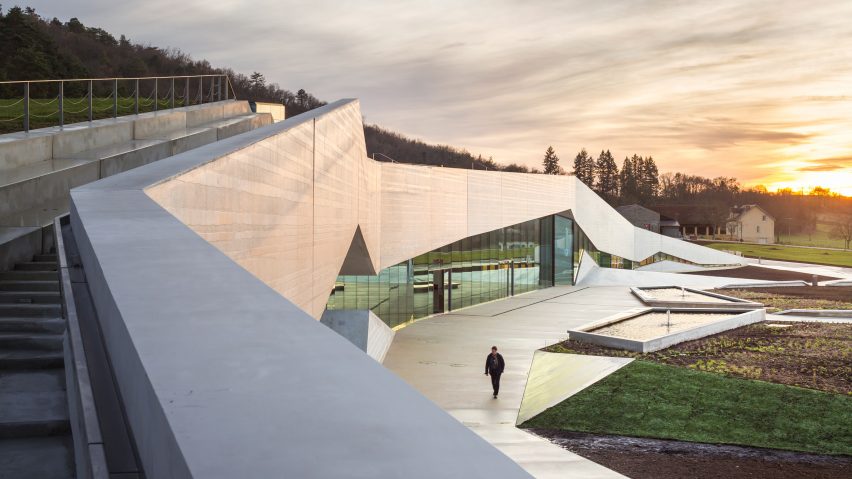These photographs capture the jagged roofline of the museum that Snøhetta has designed at the Lascaux Caves in France, to frame a huge replica of some of the world's most famous prehistoric cave paintings.
Snøhetta worked with local firm Duncan Lewis and exhibition designers Casson Mann to create the tourist attraction, which opened at the end of 2016.
Finishing touches have now been completed ahead of its official launch, as shown in these photographs by Luc Boegly and Sergio Grazia.
The Lascaux IV Caves Museum aims to recreate the dark and dank experience of the Lascaux Caves, where prehistoric paintings were discovered in 1940.
The caves in France's Dordogne region remained opened to visitors until 1948 when the decision was made to close the site to preserve the fragile paintings.
Artists have recreated fragments of the paintings inside the museum, which is kept at a constant cave-like temperature.
The team used advanced 3D laser scanning and casting techniques to achieve accurate resin replicas of sections of the caves. Over a period of two years, 25 artists hand-painted 900 metres of faux cave.
They used the same pigments as those used by the prehistoric painters to recreate almost 2,000 artworks.
"Lascaux IV offers visitors an opportunity to discover the caves in a unique way that reveals a sense of wonder and mystery, as if they, too, were the first group of adventurers to stumble upon the cave paintings," said Snøhetta, which won the design competition back in 2013.
"By framing the experience of the cave replica in contemporary design, the approach counters the potential trap of artifice: the materiality and geometry of the approach allows the visitor to understand that they are in the presence of a reproduction, without distracting from the power of its impact," added the studio.
Described as a "fissure" in the landscape, the crooked building runs along the side of a hill on the site and steps lead up over its low-lying roof.
The pale grey walls are made up from horizontal strips of concrete that emulate the limestone geology.
Long bands of glazing in the facade and roof allow slivers of light into the building, which features galleries with angled stone walls.
One of the galleries is devoted to a cinema that screens a 3D film showing other painted caves from around the world.
"Throughout the museum, the visitor experience sequences a balance of stark differences in atmospheres, light and intensities – from the enclosed exhibition spaces ensconced in the hill, to the light-filled lobby and transition spaces," said the architects.
"The juxtaposition between descent and ascent, inside and outside, earth and sky, or nature and art, evoke the analogous experience of the caves," they added.
Oslo and New York-based Snøhetta came in at number 37 on the inaugural Dezeen Hot List thanks to a run of high-profile projects.
The firm also recently completed a charred-timber tree house for the Tree Hotel in Sweden, and revealed plans for a shipping tunnel in Norway.
Photography is by Boegly + Grazia.

